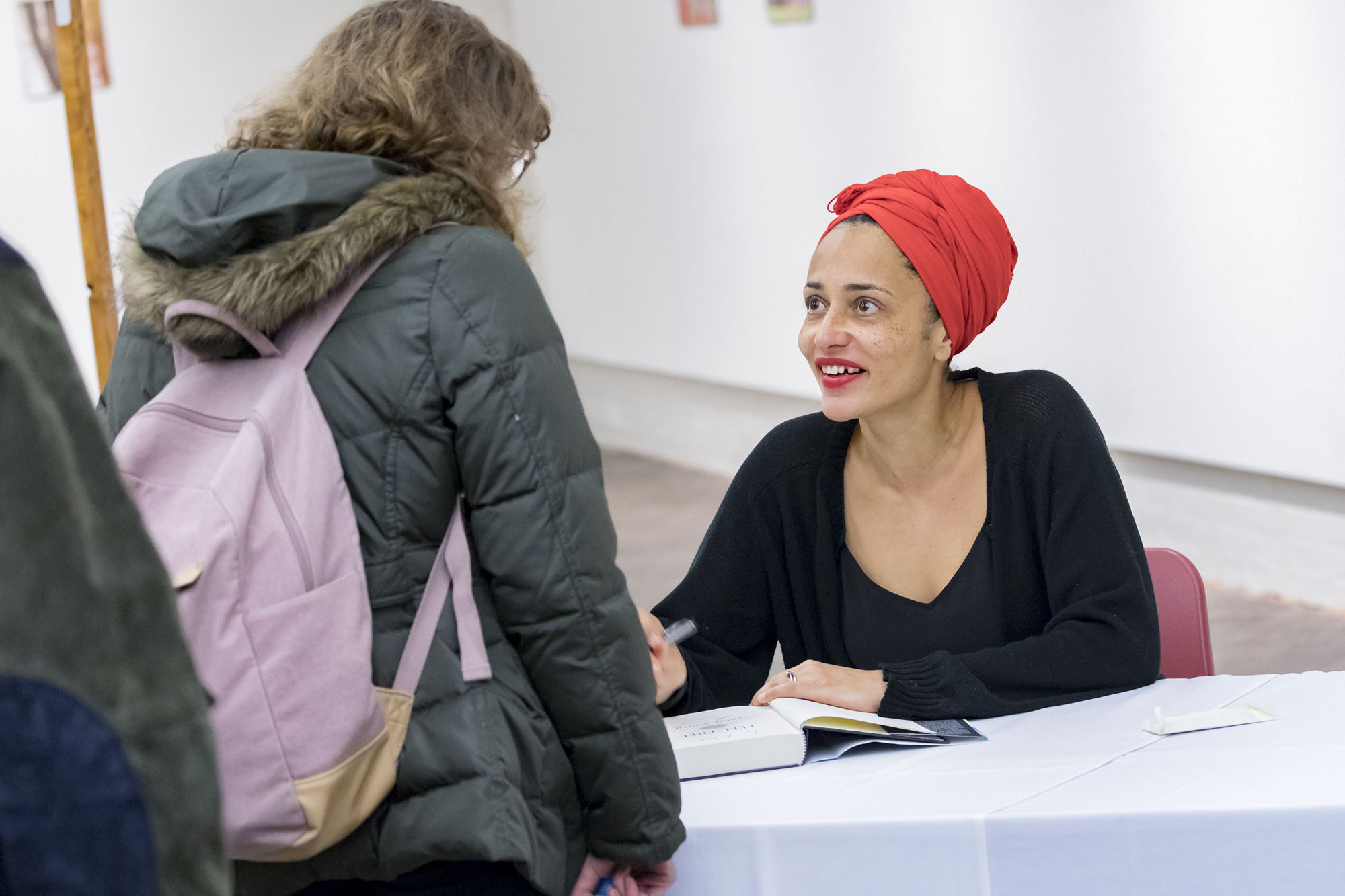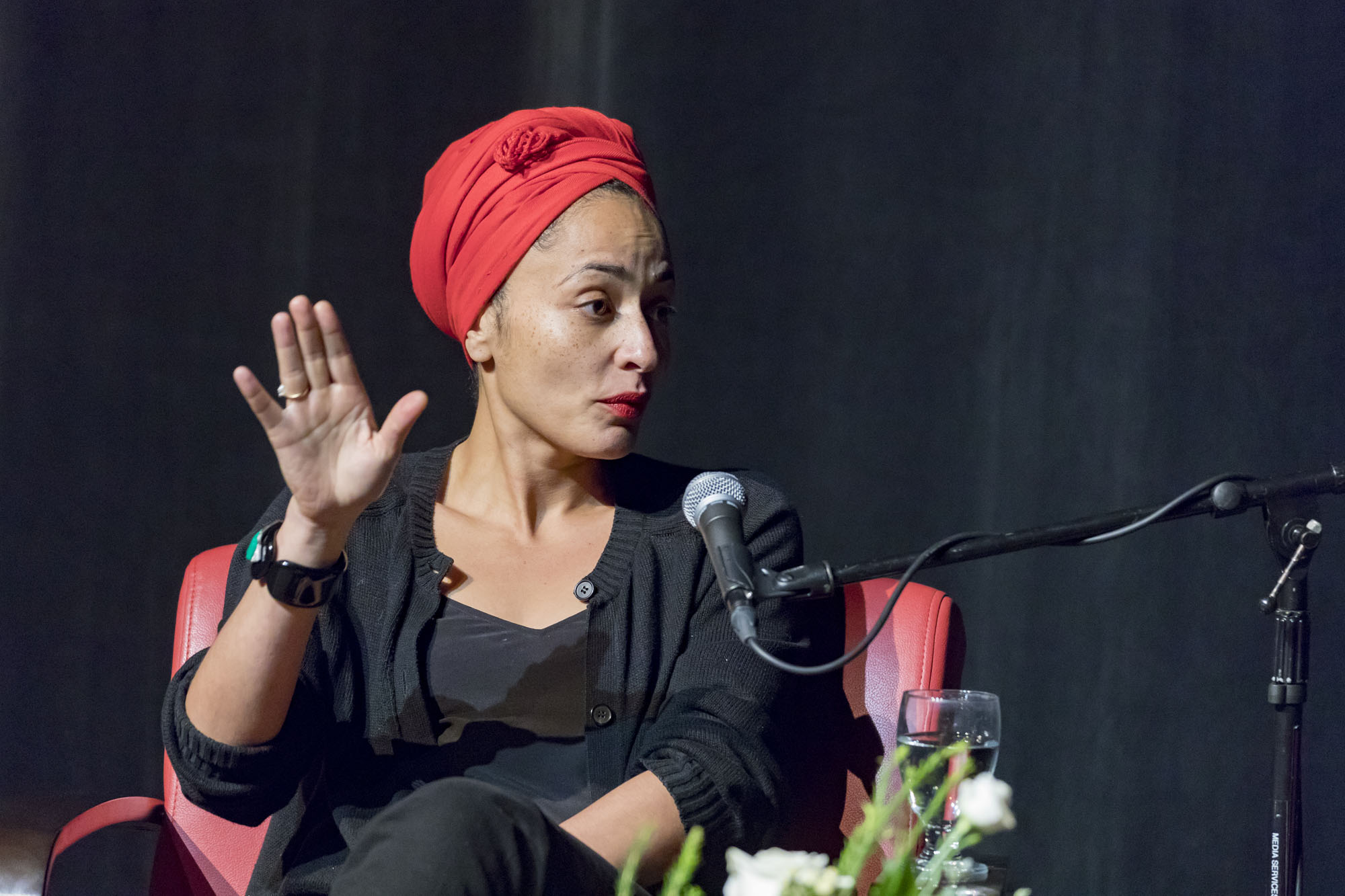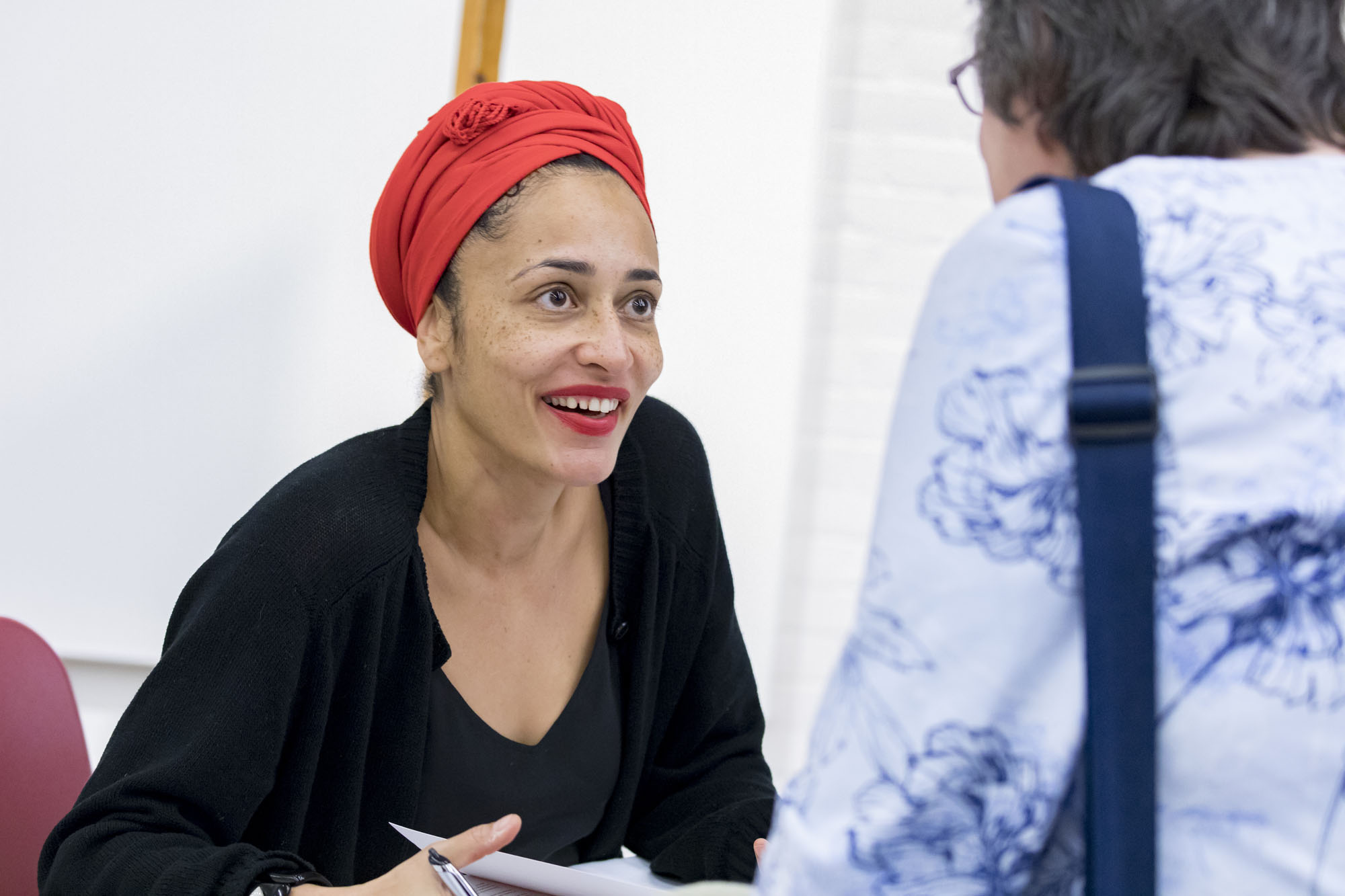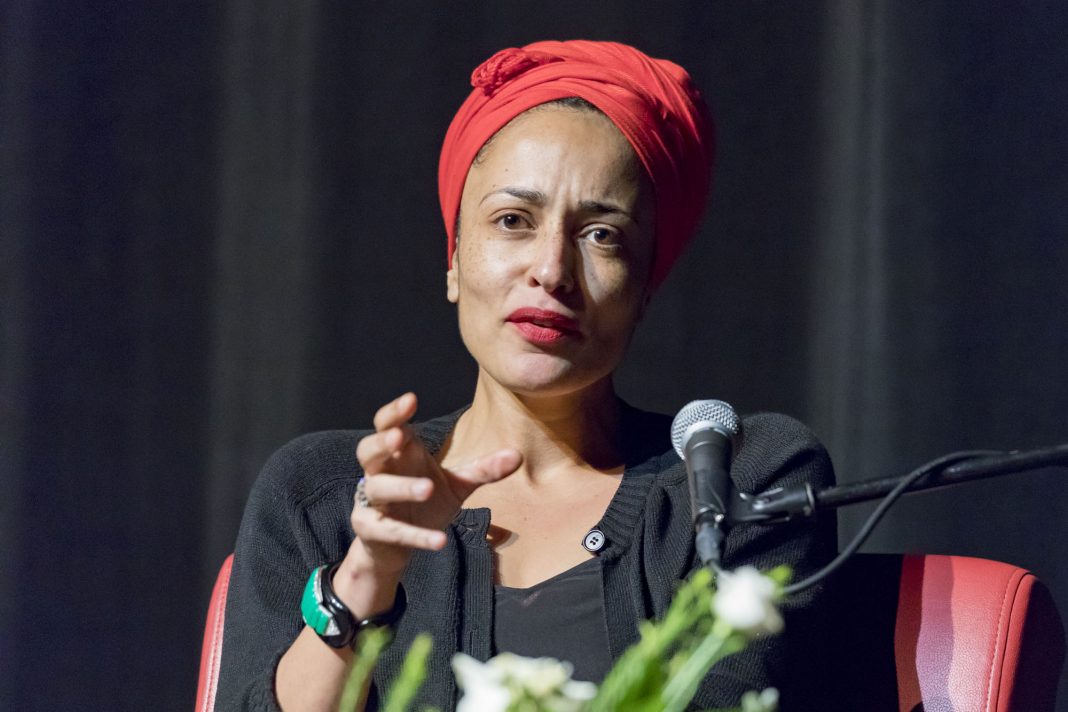As I sit down to write this article and stare for a few seconds at the blank Word doc up on my laptop screen, I inexplicably and quite suddenly burst into tears. Perhaps it’s because this piece marks my last Living Writers article, the finale of a series that I’ve immensely enjoyed writing and has brought me so much this semester. I think it’s a bit more likely, though, that this wave of emotion is the result of the first time I’m truly considering that, for an instant, my life and the life of an author who has profoundly changed it aligned.
Experiencing Zadie Smith’s presence on this campus, the act of hearing and processing her words as she invented them in real time (make no mistake, listening to Zadie is indeed an act), meeting her, if only for a few seconds – all of it was heaven. Or maybe it was something different, something less simple and straightforward. Maybe it was what Smith would call “joy,” a kind of immense, almost overwhelming sense of pain and pleasure intertwined, a sense of living purely in the moment and understanding at the same time that that moment was finite. Unbearable, yet ecstatic. Singular. Joyful.
Smith’s visit on Wednesday, Nov. 28, ended the 2018 Living Writers series with one last question & answer session with the visiting author for the Living Writers class and a final public reading, this time housed in Empie Theatre. A London native, Smith wrote her wildly successful first novel, White Teeth, whilst studying at Cambridge University. The book was published when she was just 23 years old. Among her lengthy list of awards are the Orange Prize for Fiction, the Anisfield-Wolf Book Award, the Langston Hughes Medal and several appearances on the shortlist for the Man Booker Prize. Her latest novel, Swing Time, was the common read for this year’s incoming class at Muhlenberg. For some students, though, the medium of the essay was their point of entry into the world of thought that is Zadie Smith.

Photo via Muhlenberg College Office of Communications.
“During [my] FYS last spring, Dr. Jill Stephen assigned Zadie Smith’s 2009 essay, ‘Speaking in Tongues.’ … I must’ve spent about an hour that day gushing about how it felt to encounter such articulate, thoughtful, and insightful writing. Not only did the quality of the essay strike me but also the topic: it felt like she’d taken a concept I’d already considered before but could never really craft into words,” said Michelle Rajan ‘21, a participant in the Living Writers course. “It wasn’t until a few weeks later, when a friend of mine let me borrow her copy of On Beauty, that I fell in love. Pretty much the entire day before my biology final last semester was spent on the front lawn, devouring that book. And while the storyline was interesting, sometimes I couldn’t stop reading simply because the way she described a woman putting on chapstick left me in awe. The degree to which she would embody a white man, then a black woman, then a black man in such a seamless but accurate fashion left me breathless.”
Here is one of many aspects of Smith and her work that makes both so remarkable: she can slip into any persona through language, can approximate humanity with almost eerie accuracy. But perhaps Smith’s most extraordinary skill lies in her unconscious attempts to approximate you. Her words, though they might be describing unpleasantries like familial violence or the false promise of meritocracies, are somehow comforting. They strike at a chord right behind your heart, at the place where your ribs meet your spine. They pat the deepest concerns of your soul on the back, take away isolation like air out of lungs. She knows what you’ve never admitted to yourself, and suddenly she’s gone and said it in her deep, steady voice, and you’re not the only one. I first experienced this when reading Swing Time, a novel that had me sobbing for hours and thinking for days after I had finished it. Never before had someone else gotten so close to my very sense of being. It was disconcerting. It was also a relief.
In her essays, the focus of the collection Feel Free, Smith even approximates herself, getting close to her core in some moments and admitting that she can never be truly known to us, her sea of readers, the next, a style that alumnus Kate O’Donoghue ’17 says is what makes Smith’s work so unique.
“… She really is, in the best way possible, thinking on the page. She uses writing as a way of understanding the shape of her own thoughts, as a way of arriving at an idea rather than proving her own knowledge of a subject. In a way, reading her work is like listening to somebody thinking aloud, and to get to overhear that is a gift and a wonder,” said O’Donoghue. “What was perhaps most interesting to me [about her talk] – maybe not most surprising, though – was how willing she was to work against the grain of the audience. I’m in awe of her passion and intellect, yes, but also of her eagerness to stand against popular ideas and notions regarding everything from social media and celebrity culture to matters of identity and appropriation. In that open (and warm, even) opposition, she invites a more generous reading of people and culture, and so an opportunity for us all to be more kind towards each other.”
Though Smith herself may feel strongly about these issues, insisting that instances of what is instantly dismissed as “cultural appropriation” be examined case by case, looking at some of them instead as instances of “love, fixation [or] fascination” that she does not find entirely reprehensible, she frames these opinions in an extraordinary way. “You are absolutely free to take the book and throw it across the room,” she says, “I’m perfectly willing to be ‘cancelled’ to write the kind of fiction I write.” In fact, Smith related this “cancelling” culture to capitalist tenets of use and subsequent abandonment – once someone does something worth “cancelling” them for, they are literally labeled finished, irredeemable.
Smith is wholly concerned with making writing happen – she needs to write, must get her ideas down and experiment with them, must attempt at recreating the experiences of bodies other than her own in order to create anything new. “My feeling of being no one is what allowed me to be all of these people,” she says of her characters. Smith is unwilling to collapse people and their multiple identities, including her own, into generalizations that are easy to understand and swallow, beyond the acknowledged need to assert concrete identities in order to gain rights in our current political system. We can write or create whatever we want, but audiences are equally permitted to react and reject as much as they want. Nothing is lost on either end.

Even beyond these more controversial topics, Smith’s Q&A and reading are like hearing the words of her novels and essays, in all of their striking combinations of adjectives and nouns and arresting turns of phrase, improvised aloud. “The only true noun that expresses your being is your name,” she says of the nature of freedom, “Action is the ultimate freedom and the ultimate responsibility and the hardest thing in the world to do.” On how the nature of fame might affect this freedom: “There’s nowhere you can go that you’re not [you] … To be no one is one of the great liberties of life.” She’s funny. She’s genuine, even as she insists that she’s entirely “inauthentic.” These axioms come out of her without pretense; her thoughts simply end when they end, at the natural pauses of written sentences that we don’t normally experience in speech.
“…Listening to her answers felt like watching her words dance in the air since this time she spoke them into existence rather than writing them onto the page. She engaged with each and every student, her answers fueled with such fervor,” said Rajan. “My experiences with her words felt more like an indulgence than time spent with someone else’s thoughts … listening to her read from [her essay] ‘Meet Justin Bieber!’ in Empie Theater suddenly stripped her stories and essays of their goddess-like persona and infused them with a human identity.”
Even students who had not previously encountered Smith’s work, like Jessica Bensimhon ’19, experienced a kind of awe at the reading.
“I’d heard of her, but I hadn’t read her, so I thought, ‘there’s no chance I’m going to be starstruck.’ So wrong. In an hour, I’d completely fallen in love with her mind. Everything she said was just so devastatingly intelligent, or funny, or heartbreaking, or insightful,” said Bensimhon. “[My sister and I have] exchanged pleasantries with Ada Limon, sat directly behind Ben Lerner, taken selfies with Danez Smith. Those have all been fun, unforgettable experiences. But I don’t think we’ve been as affected by any of them as Zadie. She talked a lot about the things we’re dealing with right now, and articulated them in the most incisive, earth-shattering ways … I remember just sitting there with my sister, in stunned silence, exchanging silent glances saying – Are you hearing what I’m hearing? Are you feeling what I’m feeling? … I’m finding new ways to connect with someone I’ve known almost my whole life because of Living Writers.”

Herein lies the magic of the Living Writers series: it brings people together, from those who have hardly spent life without each other to those who get to chat briefly as one signs their book for the other. It is an experience unlike anything I have ever had or will have again, and I am deeply and unfathomably grateful for it. In the words of O’Donoghue:
“To have opportunities to engage with the work and lives of writers who are active participants in literary communities and cultures around the world is an invaluable thing for young writers and thinkers. This is especially true in a place like Muhlenberg, which often feels insular and isolated from larger intellectual and artistic communities. I wouldn’t be the writer, thinker, student or poet I am today without this program, and I’m so thankful for the writers who visit, yes, but also for the faculty and staff who make the event happen. As the event comes to a close, too, we mustn’t forget that we have dozens upon dozens of Living Writers amongst us — in the faculty yes, but also in the staff and in the student body. Writing is a living thing, and I hope we as a community continue to cultivate a local culture that supports writers of all kinds, on campus and off.”






















